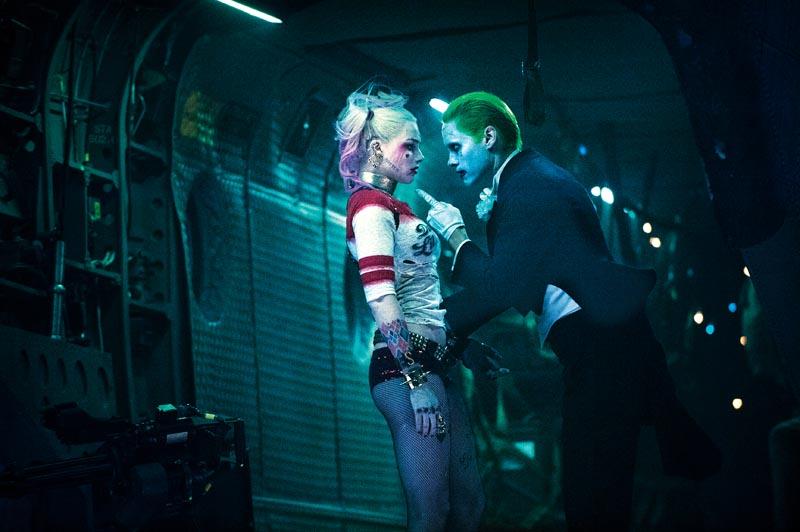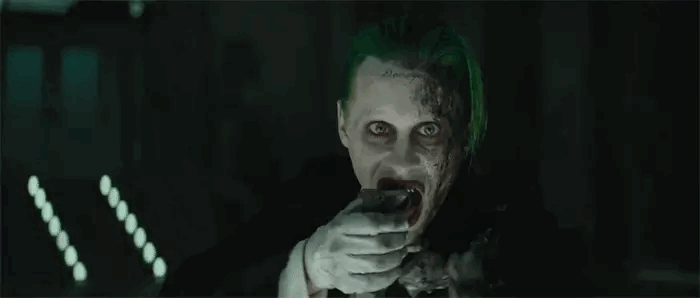Disclaimer: This editorial is the opinion of one writer and does not reflect the views of Dark Knight News as a whole.
Let me start by saying that I am mostly a fan of the Suicide Squad film, as I enjoyed it for what it was. I do, however, believe that the final theatrical version cut out a very important dynamic: The abusive domestic violence angle of Harley Quinn’s relationship with the Joker. Recent reports, paired with the meme I keep seeing on social media with #RelationshipGoals, led me to write this up.
WARNING: THE FOLLOWING MAY CONTAIN SPOILERS
Ever since that first trailer was released for Suicide Squad with “Bohemian Rhapsody” playing over quick cuts of violence and fun, it was clear that Warner Bros. had something stellar on their hands. As I mentioned in my Suicide Squad review, it has been reported that after the massive success of that trailer, Warner Bros. went back and re-hired the the company that cut the trailer to edit their own cut of the actual film! While David Ayer professes up and down that the theatrical cut is most certainly his version, the mass public doesn’t seem to believe it.
David Ayer is known for his edgy team-up corruption dramas. From The Fast and The Furious to Training Day, Harsh Times and Sabotage, studios have relied on him for both his directing and writing skills. When it was announced that he would helm Suicide Squad, it was predicted that Ayer would produce an edgy team-up flick, with some dark humor in the dialogue, and a balanced look at the individual members. In the theatrical cut, Harley Quinn was obviously given the most background, which is mostly acceptable. We got to see some of her origin; a brief bit of her working at Arkham Asylum, as well as the epic chemical vat scene when she transforms from the nerdy counselor to Joker’s salacious sidekick. The film’s side plot of Joker fighting to get Harley back served the universe well, as many praised the film for not making the lazy decision of casting the Joker as the main villain this early in the DCEU. In this day and age, however, with access to filming sets, and in-depth movie previews provided by film magazines, it is easy to see when things have been cut from the final product.
Early on in Suicide Squad‘s production, photos surfaced from the set showing an altercation between the Joker and Harley Quinn. One could speculate that there might have been some doubt in Harley’s early commitment to the Joker (back when she was still Harleen Frances Quinzel), and we saw the Joker brutally lashes out and slaps her. Harley only returns this with a kiss to solidify her loyalty. You can view a gallery of those set photos, as well as a video of the Joker slapping Harley by following this link.
Now, I’m not writing this because I necessarily want to see a woman abused on screen. I’m writing it, however, because what we got on the big screen was a lovey-dovey relationship aimed at teens who shop at Hot Topic; all of the crazy, but only hints of the darker side. With some of these shots, we can see that it is clear that the original cut of the film included another side to the Harley/Joker relationship that involved Harley loving the Joker no matter how damaging he was to her, emotionally and physically.
While the slapping scene was cut completely from the film, recent reports have verified another scene that was trimmed down for the final cut. In the film there is a scene where the Joker rescues Harley from a rooftop in excellent extravagant form. When Harley is back with her “puddin’,” he takes her in his arms and kisses her. This is a great romantic shot for the Harley/Joker fans, but a recent uncropped promo photo shows that the Joker wasn’t all hugs and kisses during this scene. Joker appears to be scolding Harley in his typical love/hate fashion. Harley’s expression looks like she might be on the verge of tears, as she is obviously hurt by Joker’s behavior after only just getting back to him, a far cry from her happy-go-lucky love-struck expression in the film.

Ever since she was created in the hit cartoon Batman: The Animated Series, Harley Quinn has always been infatuated with the Joker. The Joker, on the other hand, has always seemed to just keep her around. There were times in the cartoon where he did try to please her, but there were prominently more times when he clearly laid down the law. In the iconic episode “Mad Love,” Harley successfully captured the Batman as a present for the Joker. Instead of thanking her, the Joker beat her and threw her out a window in an attempt to kill her for stealing his thunder. This abusive behavior of the Joker’s has always been a critical factor in Harley’s story!
Now, I’m sure had this dynamic of their relationship made it to the big screen, there would be plenty of protesters claiming that it made Harley Quinn appear to be a weak, co-dependent character, instead of the stronger independent character she seems to currently portray. They would be right in that critique. In Harley’s early years, she most certainly was a weak, co-dependent female character who put her obsession with the Joker over her personal pride and safety. In recent years, the comics have developed her beyond this element by having her violently break it off from the Joker, proving that she could survive on her own without these abusive tendencies. That independence, however, is only a great development for her character if the audience first gets a chance to see her weaker origins.
An alleged list of more deleted scenes was released recently. One of them seemed to hint towards a brief clip from the trailers in which we see a charred Joker throwing a grenade. Slashfilm posted the supposed list, and the last one describes a scene where the Joker shows up after his helicopter crashed. He tries to get Harley to leave with him, but she decides to stay and help the squad. This nods to her independence in the comic. Joker realizes he’s outmatched, throws a grenade (the clip looks like smoke or flash bang variety) and leaves.

So let’s wrap this up. Removing the destructive and abusive relationship element from the film makes the Joker look like a love-sick puppy dog trying to get back his gal. Had the scenes not been cut, the film would have been more true to the animated relationship in which the Joker’s pursuit of Harley reflects a more possessive manner than a romantic care. The Joker will always look out for himself, but at the same time, he doesn’t want other people playing with his things. In the end, Harley was always just one of his things, and the film’s invasive editing certainly cut most traces of that factor from their onscreen relationship.
There are hopes that a Harley Quinn spin-off will spawn from Suicide Squad‘s financial success. Perhaps we will get more of this critical element in that film when it arrives.












